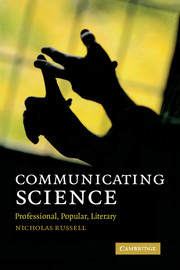Book contents
- Frontmatter
- Contents
- Introduction: What this book is about and why you might want to read it
- Prologue: Three orphans share a common paternity: professional science communication, popular journalism and literary fiction are not as separate as they seem
- Part I Professional science communication
- 1 Spreading the word: problems with publishing professional science
- 2 Walk like an Egyptian: the alien feeling of professional science writing
- 3 The future's bright? Professional science communication in the age of the internet
- 4 Counting the horse's teeth: professional standards in science's barter economy
- 5 Separating the wheat from the chaff: peer review on trial
- Part II Science for the public: what science do people need and how might they get it?
- Part III Popular science communication: the press and broadcasting
- Part IV The origins of science in cultural context: five historic dramas
- Part V Science in literature
- Index
- References
1 - Spreading the word: problems with publishing professional science
Published online by Cambridge University Press: 02 December 2010
- Frontmatter
- Contents
- Introduction: What this book is about and why you might want to read it
- Prologue: Three orphans share a common paternity: professional science communication, popular journalism and literary fiction are not as separate as they seem
- Part I Professional science communication
- 1 Spreading the word: problems with publishing professional science
- 2 Walk like an Egyptian: the alien feeling of professional science writing
- 3 The future's bright? Professional science communication in the age of the internet
- 4 Counting the horse's teeth: professional standards in science's barter economy
- 5 Separating the wheat from the chaff: peer review on trial
- Part II Science for the public: what science do people need and how might they get it?
- Part III Popular science communication: the press and broadcasting
- Part IV The origins of science in cultural context: five historic dramas
- Part V Science in literature
- Index
- References
Summary
One afternoon in January 1693 the sign outside the coffee house at the Blackfriars end of the Strand groaned in the wind howling off the Thames. At half past two the bookseller John Dunton reached the coffee house, quickly moving inside to the fire, candles and scattering of occupants. He paused once the door had closed and spotted Benjamin Steele in a corner. Beside him sat Richard Holden chewing the end of a quill. Dunton greeted them as he sat down, opening his satchel from which a heap of pamphlets and books fell onto the table, each marked with slips of paper. He fished out some blank sheets from the satchel's nether reaches and put them in front of his henchmen.
“Ben, you had best start with this German report. You should be able to run up a draft, then we'll get Harrington to make sure we have it authentic. Richard, the introduction in this botanical tome looks interesting though the Latin is awful. Show me when you've a draft. I can probably make a sensible judgement. Meanwhile I will make a start on this French piece which claims to be a lost essay by Monsieur Descartes. About that, we shall see.”
All three set to work drafting English translations of the three pieces of foreign natural philosophy; one cosmological, one botanical, one mathematical. Steele and Holden's threadbare clothes quickly became aromatic and Dunton made extensive use of a strongly scented handkerchief. That was one problem of working with Cripplegate hacks. […]
- Type
- Chapter
- Information
- Communicating ScienceProfessional, Popular, Literary, pp. 3 - 15Publisher: Cambridge University PressPrint publication year: 2009



